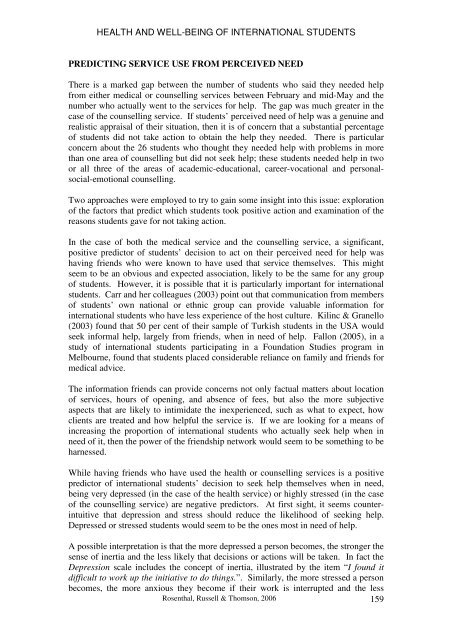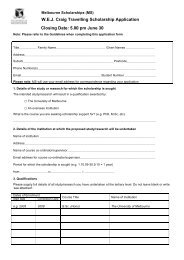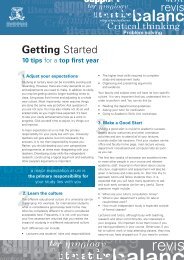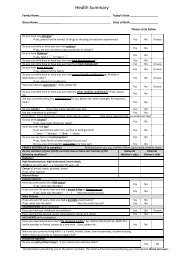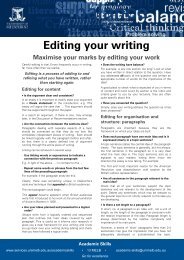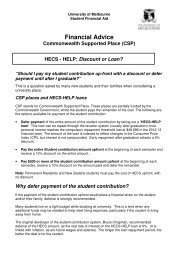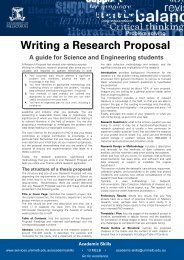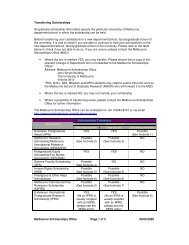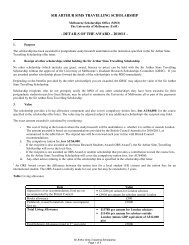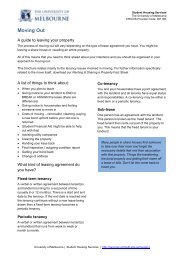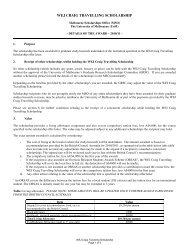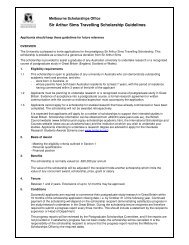a growing experience - Student Services - University of Melbourne
a growing experience - Student Services - University of Melbourne
a growing experience - Student Services - University of Melbourne
Create successful ePaper yourself
Turn your PDF publications into a flip-book with our unique Google optimized e-Paper software.
HEALTH AND WELL-BEING OF INTERNATIONAL STUDENTSPREDICTING SERVICE USE FROM PERCEIVED NEEDThere is a marked gap between the number <strong>of</strong> students who said they needed helpfrom either medical or counselling services between February and mid-May and thenumber who actually went to the services for help. The gap was much greater in thecase <strong>of</strong> the counselling service. If students’ perceived need <strong>of</strong> help was a genuine andrealistic appraisal <strong>of</strong> their situation, then it is <strong>of</strong> concern that a substantial percentage<strong>of</strong> students did not take action to obtain the help they needed. There is particularconcern about the 26 students who thought they needed help with problems in morethan one area <strong>of</strong> counselling but did not seek help; these students needed help in twoor all three <strong>of</strong> the areas <strong>of</strong> academic-educational, career-vocational and personalsocial-emotionalcounselling.Two approaches were employed to try to gain some insight into this issue: exploration<strong>of</strong> the factors that predict which students took positive action and examination <strong>of</strong> thereasons students gave for not taking action.In the case <strong>of</strong> both the medical service and the counselling service, a significant,positive predictor <strong>of</strong> students’ decision to act on their perceived need for help washaving friends who were known to have used that service themselves. This mightseem to be an obvious and expected association, likely to be the same for any group<strong>of</strong> students. However, it is possible that it is particularly important for internationalstudents. Carr and her colleagues (2003) point out that communication from members<strong>of</strong> students’ own national or ethnic group can provide valuable information forinternational students who have less <strong>experience</strong> <strong>of</strong> the host culture. Kilinc & Granello(2003) found that 50 per cent <strong>of</strong> their sample <strong>of</strong> Turkish students in the USA wouldseek informal help, largely from friends, when in need <strong>of</strong> help. Fallon (2005), in astudy <strong>of</strong> international students participating in a Foundation Studies program in<strong>Melbourne</strong>, found that students placed considerable reliance on family and friends formedical advice.The information friends can provide concerns not only factual matters about location<strong>of</strong> services, hours <strong>of</strong> opening, and absence <strong>of</strong> fees, but also the more subjectiveaspects that are likely to intimidate the in<strong>experience</strong>d, such as what to expect, howclients are treated and how helpful the service is. If we are looking for a means <strong>of</strong>increasing the proportion <strong>of</strong> international students who actually seek help when inneed <strong>of</strong> it, then the power <strong>of</strong> the friendship network would seem to be something to beharnessed.While having friends who have used the health or counselling services is a positivepredictor <strong>of</strong> international students’ decision to seek help themselves when in need,being very depressed (in the case <strong>of</strong> the health service) or highly stressed (in the case<strong>of</strong> the counselling service) are negative predictors. At first sight, it seems counterintuitivethat depression and stress should reduce the likelihood <strong>of</strong> seeking help.Depressed or stressed students would seem to be the ones most in need <strong>of</strong> help.A possible interpretation is that the more depressed a person becomes, the stronger thesense <strong>of</strong> inertia and the less likely that decisions or actions will be taken. In fact theDepression scale includes the concept <strong>of</strong> inertia, illustrated by the item “I found itdifficult to work up the initiative to do things.”. Similarly, the more stressed a personbecomes, the more anxious they become if their work is interrupted and the lessRosenthal, Russell & Thomson, 2006 159


